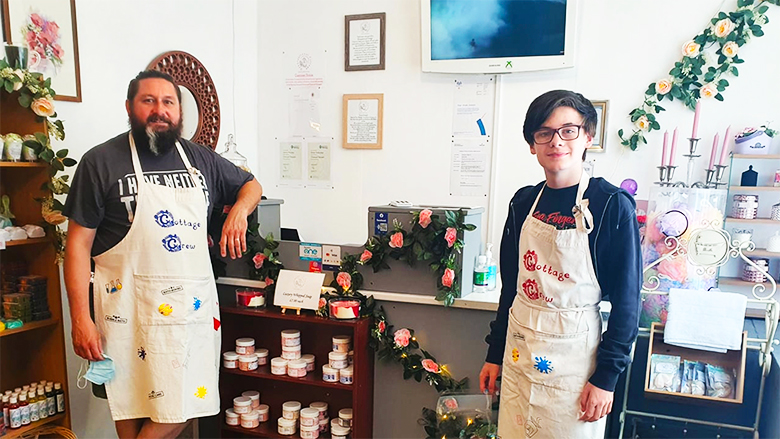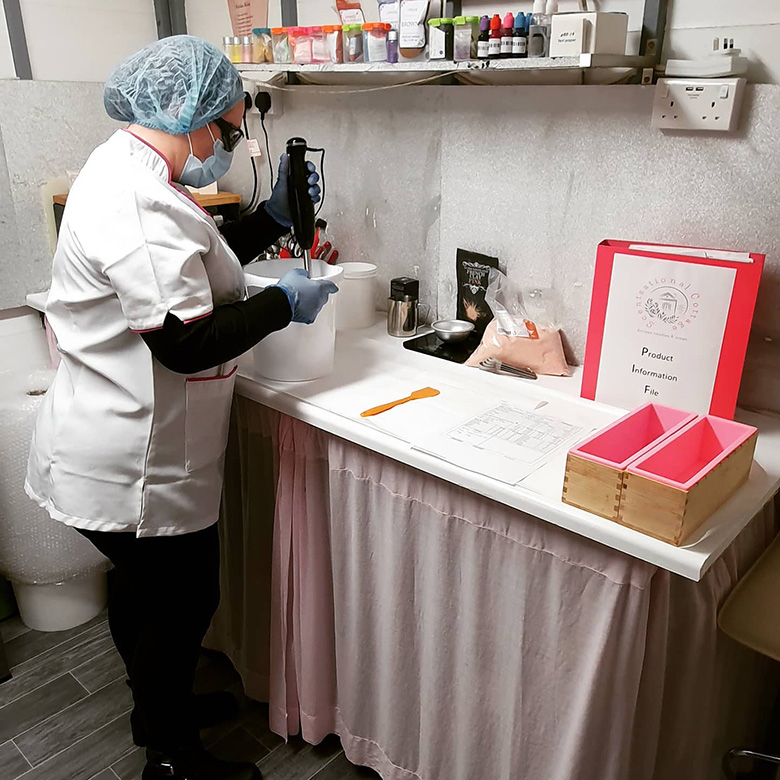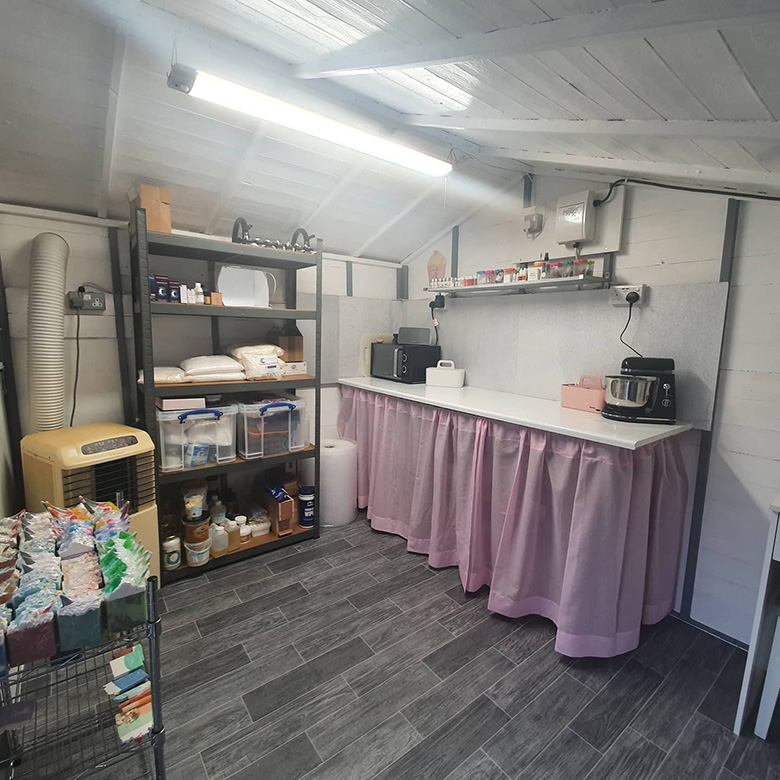Purple Shoots is the only microfinance charity that loans in the UK. How have they operated in one of the countries worst affected by the Covid-19 pandemic?
Holding back her tears, Nicky Stephenson reached over the counter to touch the hand of Purple Shoots founder Karen Davies. The smell of peppermint candles filled the room and the music of Rat Pack from the vintage Blaupunkt radiogram played softly in the background. Looking around her shop she told Karen that she gave her hope when no one else could. Sat in her candle shop in Newbridge, South Wales she explained how the loan from the charity changed her life.
Nicky needed money to give her shop a more professional look and to settle some supplier invoices and overdue rent. She had applied for a credit card, reached out to everyone, even her local MP but no one had been able to help. She eventually put her predicament on Facebook and was referred to Karen.
“Purple Shoots helped us when no one else would, … if it wasn’t for Purple Shoots we would never have been able to celebrate our first birthday of the business,” said Nicky. “We are managing to survive and cover all the overheads at the moment. The next step is to hopefully pay myself the first salary at Christmas.”
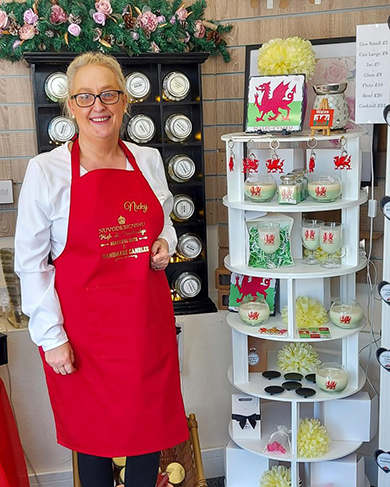
(Image credit: Purple Shoots) 
(Image credit: NuVo Designs)
The money that Nicky received for her business is defined as a microfinance loan. Microfinance is the provision of financial services such as loans, savings, and insurance to people who are normally excluded from traditional banking services.
Purple Shoots have been operating for eight years and offer services for people who Karen believes are at the bottom of the economy and left behind. They provide loans, business assistance, and financial advice for people who want to start their own business and or expand their current one more.
“I could see a real gap at the bottom of the market and nobody prepared to fill it,” said Karen.
They help borrowers at the beginning of the loan process to put a plan together or offer support if there is any part of the business they are struggling with.
“Sometimes when we do the application process, it’s clear that there’s a gap in knowledge, maybe they don’t know how to market on social media, or maybe they’re not good at accounts,” said Karen. “Then we can either we will help them or put them in touch with somebody we can.”
They lend borrowers up to £3,000 and charge borrowers 14.5% per annum (APR 25.19% – 25.91%). So if a borrower has a £2,000 loan over two years, they end up paying £107.50 per month and a total of £2,580.
This is a much lower rate than many payday loans which can charge up to 1,500% APR in one year. According to the MoneySavingExpert these loans are often handed out irresponsibly and mis-sold to many who couldn’t afford to re-pay them. Many of whom formed part of the financially excluded.
Financial exclusion is broadly defined as a lack of access, and ability to use a wide range of financial services. These services are normally bank accounts, savings, and insurance. Financial exclusion is usually exacerbated by individual and household financial issues.

Financial inclusion is a key part of Welsh Policy development as it is estimated that 16% of the population is indebted.
The central and eastern valleys of Rhondda Cynon Taf, Caerphilly, Merthyr Tydfil and Blaenau Gwent have particularly high levels of indebtedness. These areas also coincide with the places that Karen operates and is one of the reasons she set up Purple Shoots
“I worked for nearly 15 years in the financial services industry, and I was fed up with turning down people who shouldn’t have been turned down,” said Karen. “So people with good business plans, they didn’t fit the criteria of whatever organisation I’ve worked for, usually because they’ve got a bad credit score, or no money to put in.”
For Purple Shoots their biggest issue during the pandemic was always going to be money.
“Lots of our clients didn’t qualify for any of the government support, so couldn’t pay us,” said Karen. “We were forced to get repayment holidays, so it meant that our income sort of collapsed.”
They stopped lending in the first lockdown, however as restrictions began lowering in June 2020 demand for their services grew. Karen said that they have seen a surge of people wanting to start a business in spite of the difficult economic climate in Wales.
“Some of the people who’ve lost a job during Covid or have been furloughed for so long that they feel unwanted and it’s given them time maybe to have a rethink, and to look around them and see what’s needed and start something new,” she said.
Karen explains that whilst they were able to raise the money through external support, it was still a big worry of theirs.
Another issue that presented itself to Purple Shoots during the pandemic was the inability to meet borrowers and explore their reasons for taking out a loan in great depth. Karen explains that a lot of their lending is based upon a relationship with the borrower. Which they couldn’t do in lockdown.
“I’m worried that that might have meant we made bad decisions because we couldn’t get all the signals that you get when you meet someone personally,” she said.
This was made even harder when they switched their meetings to online or decided loans through phone calls, which many borrowers were not comfortable with. However, Karen thinks that it is still too early to say as the real impact of these loans will only start to uncover in the next year as we slowly leave the pandemic.
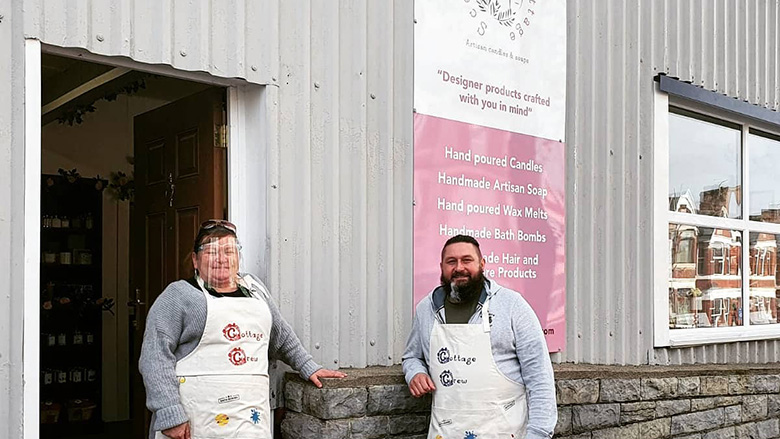
Karen predicts that the pandemic has also made it harder for her to spot potential mistakes being made by the borrowers. The story of someone who had previously loaned from Purple Shoots to open a barber shop, emphasises this well she believes. They had spoken to Business Wales who had told them they could help them find an apprentice. So they went to Karen asking for a loan for another chair and equipment for the apprentice. But Karen asked though if they were busy enough to do that, and it turns out that they weren’t at all. He would have had an apprentice with no hair to actually cut.
Karen had been able to talk them out of a decision that could have really badly affected their business. She predicts that her inability to exercise governance has taken away her chance to spot these blunders before they happen.
Karen was also very impressed at the resilience of her current borrowers also. “I feel that’s the real strength, that they were determined to survive,” she said. “They did whatever it took to survive and they didn’t just throw up their hands in horror and say, nobody’s helping me they knew they had to help themselves.”
One of Karen’s borrowers who owns a cleaning business had a lot of elderly clients. So when the pandemic limited her ability to visit those customers she thought of new business ventures when she could trade again. She spent the lockdowns developing her own range of environmentally friendly. cleaning products as it was something she had always wanted to do.
“So if they couldn’t actually diversify, they were quite resourceful in thinking ahead and planning for something new when they could work again,” said Karen
Ruth Hancock from Scentsational Cottage is another great example of how her borrowers have adapted and diversified, said Karen. Ruth created a website that allows her to post deliveries and also offer a click and collect service.
Ruth needed the loan in order to get her cosmetic assessment so she could sell her products legally. Much like Nicky she had tried everywhere to get credit but was constantly turned down due to her credit score.
“Purple Shoots do not work like usual creditors, they listen to your idea, look at your business plan and assess you on your idea and not your past,” said Ruth. “Business Wales and Government business programs cant help people like myself, but Purple Shoots did.”
Ruth explained that the impact that Purple Shoots has had on her life is astronomical.
“I am now almost out of debt, I own a thriving business, which continues to grow,” said Ruth. “My mental health is improving due to this and it has enabled our family to adopt a daughter and save another life, just as mine has been.”
In order to see more examples like Ruth’s, Karen believed that ‘levelling up’ is very important when it comes to microfinance in Wales. To her, it means everyone has the same opportunity.
“The people that we support, are perfectly capable and good people, but they don’t have fair access to finance so levelling up would mean them being treated the same,” said Karen. “But it also means helping those areas that are more deprived, move up onto a level with the others”
Alongside her hopes to ‘level up’ financial inclusion in Wales, Karen believes a change in the benefits system to better support self-employment is also essential.
“At the moment, it’s if you’re on benefits, it’s a real discourager to go into self-employment because you have to sort of take the risk and register and sign off from benefits,” she said.
Although Universal Credit does continue, the more you earn the quicker it tapers away. For every pound you earn over your work allowance, it reduces by 63 pence.
“That means they can’t build any reserves in the business, they can’t look for things going wrong,” said Karen. “That can cause failure sometimes because they get to the point where a piece of machinery fails or a vehicle fails, and they can’t repair it, and then that’s the end of the business.”
Karen explains that it also discourages a lot of people in their self-reliant groups who aren’t fully able-bodied. They want to be able to try self-employment and then revert back to benefits if they can’t do it. Yet if you try it and you lose all your benefits, it’s such a struggle to get back on, she explained.
“You have to declare income and then you lose income, it just all works against you,” she said, “So there’s lots of reasons why the benefits system actually discourages self-employment when it should encourage it.”
Karen believes that the communities in South Wales play a large role in Purple Shoots success as most people hear about the organisation through word of mouth. As when they have loaned to one area they often receive two or three other applicants from the same place.
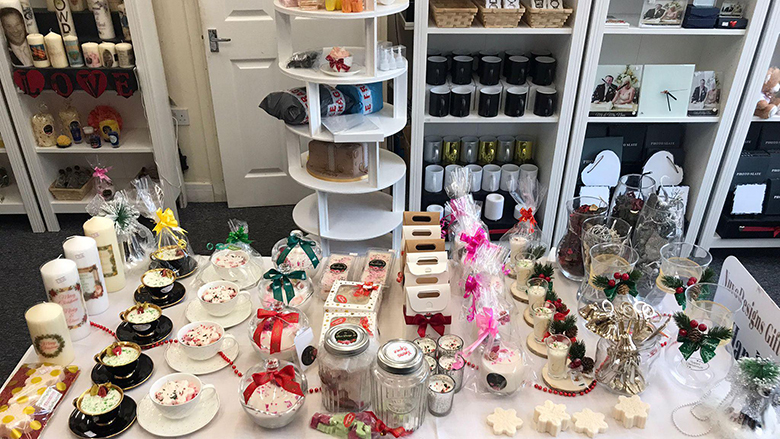
This sense of community also explains why so many businesses have succeeded explained Karen.
“There’s a strong sense of community here so that somebody starts a small business in the community in ways is more likely to be supported by the people around them than maybe in London,” said Karen. “Many people start with the local businesses, then they go on to commit to the community and good things happen often.”
Stories like Ruth’s and Nicky’s show the relationship and strong community spirit that Purple Shoots has tried to foster in South Wales. Borrowers of Purple Shoots have shown the impact that financial inclusion can have in South Wales.
“I never dreamed my business would take off in the way it has,” said Ruth. “I now have a boutique, a professional workshop and am looking to bring Wales’ first couture perfumery and bespoke candle service to life, all this is due to the help I received from Purple Shoots.”
